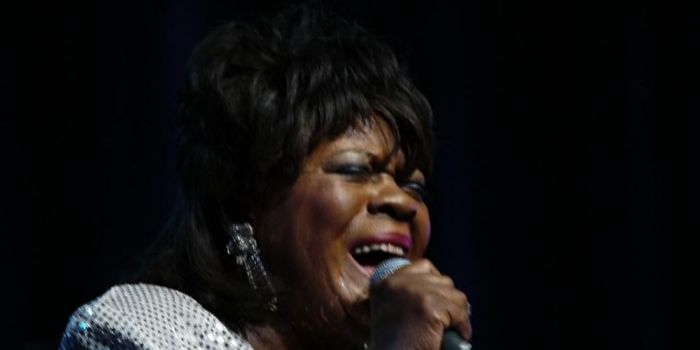28.09. – Happy Birthday !!! By the mid-1990s, Koko Taylor was acknowledged as the world’s foremost female blues singer. The influence of the Grammy award-winner can be heard in the work of everyone from Bonnie Raitt to Tom Waits.
It was in 1962 that Taylor, then working as a domestic cleaner in Chicago for affluent white families, was first heard by the songwriter and producer Willie Dixon. “My God,” he said, “I never heard a woman sing the blues like you sing the blues.” Who, he asked, did she record for? Taylor confessed that she was ignorant about the very concept of making records.
Signing her to Chess, Chicago’s powerhouse blues, soul and rock’n’roll label, Dixon wrote and produced her sessions, developing her abrasive vocal into a formidable electric blues instrument. In 1966 she recorded Wang Dang Doodle, an earlier hit for Howlin’ Wolf. Backed by the guitarist Buddy Guy, Taylor tore through the song. The black American public rewarded her with a number four hit on the R&B charts – the last Chess blues hit single – and she played the Apollo in Harlem and toured widely. In 1967 she visited Europe as part of the American folk blues festival. Dixon recorded two albums with her but nothing came close to repeating the success of Wang Dang Doodle.
Taylor was born Cora Walton in Bartlett, Tennessee. She was nicknamed Koko by her sharecropper parents, due to her love of hot chocolate. She developed a love of music from hearing gospel in church and the blues played at plantation parties. Both her parents died young and she received little formal education, instead being obliged to pick cotton. She shifted to Memphis, worked as a cleaner and married a truck driver, Robert “Pops” Taylor. They moved to Chicago in 1952, arriving, said Taylor, with a box of crackers and 35 cents.
It was then that she began to attend Chicago blues clubs at weekends, guest-singing with the likes of Muddy Waters, Howling Wolf and Jimmy Reed. Then came Dixon.
In 1969 Chess’s founder, Leonard Chess died. The label faltered, Taylor’s contract was terminated and she was forced back to domestic work.
In 1975 Alligator Records, a label that had identified the new blues audience as college-educated album buyers, signed Taylor. Her Grammy-nominated debut album, I Got What It Takes, took Taylor to that audience. She grabbed the opportunity, touring relentlessly and regularly releasing albums of new material on Alligator. She won a best traditional blues album Grammy (1985), and appeared in David Lynch’s movie Wild at Heart (1990) and John Landis’s Blues Brothers 2000 (1998).
From 1994 until 1999 she ran her own blues club but found that her name alone did not guarantee full houses. Touring earned her lucrative fees – she played at the Carnegie Hall and the Montreux jazz festival – but this led to her voice becoming ragged, and several indifferent albums. Her husband, who had become her tour manager, was seriously injured in a car crash in 1988 and died the following year. In 1996 she married Hays Harris.
I interviewed Taylor in Chicago last year. She was in high spirits, proud of her music and aware of her place in the legacy of African-American blues singers. Much more gentle in person than her raucous singing ever suggested, she reflected on how a song she learned from her father, in the cotton fields, appeared on Old School alongside her own compositions.
“Koko grew up in blues culture, as a sharecropper and learning from listening to other singers, not just to records,” Alligator’s founder Bruce Iglauer told me. “People feel how rooted she is in the true blues tradition, and respond to that.”
She is survived by Harris, her daughter Joyce, two grandchildren and three great-grandchildren.
Koko Taylor (Cora Walton), singer and songwriter, born 28 September 1928; died 3 June 2009.
https://www.youtube.com/watch?v=35W5V6SQn94







More Stories
Interview with Janis Siegel of The Manhattan Transfer: Jazz, being a more refined, interpreted form of music
CD review: George Benson – Dreams Do Come True: When George Benson Meets Robert Farnon – 2024: Video, CD cover
The band was tight as ever. The Warren Haynes Band cuts loose: Video, Photos